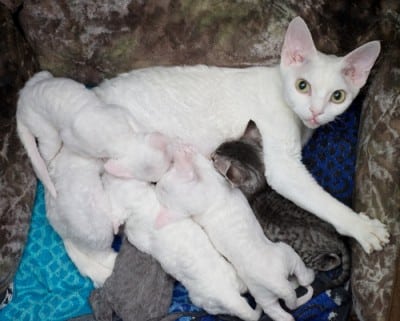I Breastfed My Friend’s Baby And Loved It
 My 5-year-old is finally weaned. Think that’s shocking? It’s good you didn’t know me when she was a baby. Because the length of time her breastfeeding continued is nothing compared to the frequency of her breastfeeding as a newborn. Most babies eat every three hours or so, but she was more likely to unlatch after three hours — for about three minutes — and then latch on again. I was lucky enough to have ample supply and the desire and ability to quit working, but breastfeeding her was still time-consuming, draining and utterly exhausting.
My 5-year-old is finally weaned. Think that’s shocking? It’s good you didn’t know me when she was a baby. Because the length of time her breastfeeding continued is nothing compared to the frequency of her breastfeeding as a newborn. Most babies eat every three hours or so, but she was more likely to unlatch after three hours — for about three minutes — and then latch on again. I was lucky enough to have ample supply and the desire and ability to quit working, but breastfeeding her was still time-consuming, draining and utterly exhausting.
I used to lie in bed for hours on end, baby firmly latched to my boob, and fantasize about a few minutes alone. Sometimes I thought it would be nice if I got severely ill and had to go to the hospital for a few days, because then I’d get to sleep. But mostly, I wished for a break. Just a few hours. I wanted to go sit at a coffee shop for an afternoon and not worry that my baby was screaming for me the entire time I was gone.
But with a baby who refused a bottle or a pacifier and wailed whenever her mouth wasn’t latched onto my boob, there was only one solution I could imagine that would have given me the break I needed.
What I really wanted, I decided, was a wet nurse.
At the time, I thought wet nursing was a practice that disappeared around the same time as live-in servants and horse-drawn carriages. That didn’t stop me from daydreaming. I imagined living in a tent with a hunter-gatherer tribe, surrounded by friends and sister wives who were all breastfeeding. I would walk away to gather berries or fetch water, leaving my baby happily cradled in the arms of another woman and latched onto her boob instead of mine. For an hour or so, I would be alone. Baby-less. Free.
Occasionally, I brought the idea up to other moms. In my neighborhood playgroup, where all the kids were close in age and most were breastfeeding, I jokingly mentioned how nice it would be to trade off occasionally. I laughed when I said it, and if my laugh had an edge of desperation, no one noticed. They also didn’t take me up on it. I brought the idea up more seriously with my sister-in-law, whose baby was two days older than mine. She hid her shock well, but she made it plain she wasn’t interested. And so I breastfed on — and on, and on — alone.
By the time my son was born, I’d found a different community. I’d discovered that milk sharing and cross-nursing are alive and well in certain circles, and I had plenty of friends who had done it, or at least were open to trying it. I even made tentative plans with one pregnant friend to babysit for each other and cross-nurse. But in the chaos of adjusting to newborns, somehow we never did. And since my son nursed in a much more manageable pattern than his sister, waiting several hours between feedings and happily unlatching when he was done, I never felt the need for a wet nurse. I got plenty of breaks, and my oversupply made me hesitant to even try to skip a feeding.
One day when my son was nearly a year old, I left him at home with my husband and went to a party. One of the other women there was a close friend of mine who had given birth to twins just a few weeks before. She had brought her babies with her, and when it was time for them to eat, she handed me the boy so she could nurse the girl. As I gently cradled the newborn, he turned his head to root at my chest. And suddenly it seemed absurd to make him wait for his sister to finish. Because I was right there with my breasts full of milk, and a hungry baby in my arms.
So I asked my friend, “Do you mind if I nurse him?”
“Please do!” she said.
I sat down in the rocking chair across from her and offered him my breast. Within minutes both twins were drifting to sleep, one on her breast and one on mine. His face looked strange at that angle — so different from either of my baby’s. His newborn latch, too, felt different from my son’s. But the way he relaxed against my body, curling his fingers around mine? That was exactly the same.
Cross-nursing isn’t recommended by any health organization. Even the breastfeeding advocates of La Leche League discourage it. It’s true that human milk is a bodily fluid, and cross-nursing can spread disease. But it’s also true that in the U.S., pregnant women are routinely tested for STDs, and a mother who’s safely breastfeeding her own baby is probably healthy enough to breastfeed another. And if the woman is a close friend who you trust to tell the truth about her own health — why not cross-nurse?
The few proponents of it tout the bonding benefits. It’s sweet and supportive and it brings friends closer together. When I imagined it, I pictured my co-mothers and I feeling close as sisters while my children bonded forever with their “milk siblings.” But the reality, I found, is that cross-nursing — like all breastfeeding — isn’t primarily about bonding. It’s not just about connection or love or support. Yes, it can include all those things, and usually does. But its real point is more practical: feeding a hungry baby.
Contrary to much of the propaganda, the point of breastfeeding isn’t to bond, or to make your kid smarter, or to make him thin and healthy and beautiful. And breastmilk, as wonderful as it is, isn’t magic unicorn rainbow juice that cures everything. No, despite all its benefits, breast milk is really just baby food, and the point of it is to feed a baby. And if your baby needs some and I have extra, why wouldn’t I share?
I’m not looking for a wet nurse anymore, at least not unless I have another baby. I’ve still got an oversupply, and my toddler is too distracted to nurse much these days. But if you’re breastfeeding a bottle-averse baby and desperate for a break, you should give me a call. Sure, we can bond and swear undying sisterhood if you want. But that’s not important. What’s important is that you can get away for a while.
Go relax at the coffee shop for a few hours. I’ll feed your baby.
(photo: ADA_photo / Shutterstock)






